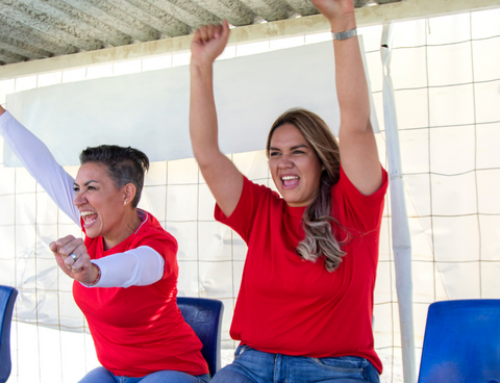How Parents Can Train the Next Great Athlete
You can breed an athlete. One of my college teammates (now with the Cleveland Browns) is 6’7″and 315 pounds. He is married to 6’3″ former collegiate basketball player. Do you think their kids are going to be tall and athletic?
Genetics play a heavy role in the makeup of a youth athlete. Genes influence strength, muscle size, muscle fiber composition (fast or slow twitch), anaerobic threshold, lung capacity, flexibility, and, to some extent, endurance. (For more information, see The Role of Genetics In an Athlete’s Strength Potential.)
However genetics is not the only factor that make an athlete. Yes you can breed an athlete, but you can also train one.
When coached and developed properly, young athletes can improve their skills. Just regularly maintaining an active lifestyle (meaning playing outside and not inside) will help children naturally acquire and develop many of the skills necessary for sports.
If you want your genetically matched, or simply your much-loved, children to reach their full athletic potential, you must start when they’re young and receptive to information. It is more difficult to start trying to build muscle and correct lifelong bad technique habits during their high school years.
Some of the best athletes were made from running and jumping around outside. The best technique for getting kids to train, whether it’s for sports or recreation, is to make it fun. Reward them for their accomplishments, offer variety, and keep reminding them that it takes time to get better. Encourage friendly competition. (Read Understanding and Improving Motivation for Sports Success.)
The benefits of a strength and conditioning program for youth athletes include improving muscle strength, increasing bone mineral density, honing body composition, enhancing cardiorespiratory fitness, and developing motor performance skills. (See: 3 Questions To Ask Before Starting a Youth Sports Training Program.)
If you can get your 8- and 9-year-old kids to train like they were preparing for the NFL Combine or an NBA draft camp, how well do you think they’ll do when they’re old enough to perform in those events?
RECOMMENDED FOR YOU
MOST POPULAR
How Parents Can Train the Next Great Athlete
You can breed an athlete. One of my college teammates (now with the Cleveland Browns) is 6’7″and 315 pounds. He is married to 6’3″ former collegiate basketball player. Do you think their kids are going to be tall and athletic?
Genetics play a heavy role in the makeup of a youth athlete. Genes influence strength, muscle size, muscle fiber composition (fast or slow twitch), anaerobic threshold, lung capacity, flexibility, and, to some extent, endurance. (For more information, see The Role of Genetics In an Athlete’s Strength Potential.)
However genetics is not the only factor that make an athlete. Yes you can breed an athlete, but you can also train one.
When coached and developed properly, young athletes can improve their skills. Just regularly maintaining an active lifestyle (meaning playing outside and not inside) will help children naturally acquire and develop many of the skills necessary for sports.
If you want your genetically matched, or simply your much-loved, children to reach their full athletic potential, you must start when they’re young and receptive to information. It is more difficult to start trying to build muscle and correct lifelong bad technique habits during their high school years.
Some of the best athletes were made from running and jumping around outside. The best technique for getting kids to train, whether it’s for sports or recreation, is to make it fun. Reward them for their accomplishments, offer variety, and keep reminding them that it takes time to get better. Encourage friendly competition. (Read Understanding and Improving Motivation for Sports Success.)
The benefits of a strength and conditioning program for youth athletes include improving muscle strength, increasing bone mineral density, honing body composition, enhancing cardiorespiratory fitness, and developing motor performance skills. (See: 3 Questions To Ask Before Starting a Youth Sports Training Program.)
If you can get your 8- and 9-year-old kids to train like they were preparing for the NFL Combine or an NBA draft camp, how well do you think they’ll do when they’re old enough to perform in those events?












